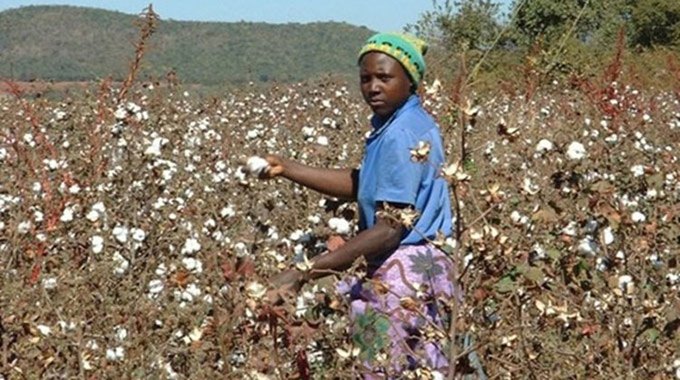Why building resilience of smallholder farmers matters

Sifelani Tsiko Senior Writer
The frequency of droughts is increasing here in Zimbabwe and most other southern African countries.
Successive years of dry conditions have depleted household resources and disrupted crop and livestock-based livelihoods, constraining access to food and income for many people relying on rain-fed agriculture.
Memories are still fresh of the 2015-2016 El Nino-induced drought which swept across Zimbabwe and the entire southern African region.
The impact of the drought that swept across the Sadc region in the 2015-2016 period was felt across all sectors, including agriculture, food and nutrition security, tourism, energy, health, water and sanitation and education.
A majority of small-scale farmers struggled to produce enough food to feed their families owing to the drought that ravaged most parts of Zimbabwe.
The drought left up to 40 million people in need of food assistance across the region, according to the Food and Agriculture Organisation (FAO). Out of this, 23 million required immediate assistance.
Zimbabwe was one of the worst affected countries by the driest year in decades that faced southern Africa — including Malawi, Zambia, Lesotho, Swaziland and South Africa.
The UN’s World Food Programme reported that about 16 million people in southern Africa faced hunger due to poor harvests in 2015, caused by El Nino weather conditions.
It is also worrying that our climate experts are saying that Zimbabwe and the entire SADC region must brace for another season of normal to below-normal rainfall as we face another El Nino weather pattern, which can turn out to be similar or closer to the 2015-2016 El Nino-induced drought.
Experts, both at local and at SADC level forecast that the 2018-2019 rainfall season could be affected by the El Nino phenomenon, which is usually associated with droughts in the region.
All this points to the importance of building resilience of smallholder farmers in drought-prone areas.
It is commendable that FAO, the Government and other development partners have been running programmes to build the capacity of Zimbabwean smallholder farmers to respond to shocks that come with droughts.
The interventions responding to the shocks are fortunately long-term, involving the upgrading and rehabilitation of 20 smallholder irrigation schemes by the FAO and the Government.
This is by far better than providing short-term measures, which may involve providing assistance to affected communities in terms of farm inputs, agricultural equipment, staple food for daily consumption, or cash income.
Handouts are humiliating than empowering smallholder farmers to respond to droughts on their own and with minimal assistance.
Most developmental interventions tend to do little to focus on policy measures and capacity building that can enable smallholder farmers to anticipate, respond and cope with the impact of the shocks which may be repeated in the future.
This is where international development agencies need to place much emphasis. The rehabilitation of irrigation schemes helps to boost crop production, incomes and livelihoods. Its long term, it can build the resilience of smallholder farmers to confront drought shocks.
Interventions by FAO, Government and other developmental organisations need to link short-term humanitarian aid activities with long-term development initiatives to help empower our farmers to withstand drought shocks.
Our farmers must be able to prepare for, cope with and recover from drought shocks. It is heartening to see that farmers through FAO projects, are diversifying into other income-generating activities apart from crop and livestock production.
Through the improved Nutrition Sustainable Production for Increased Resilience and Economic growth (INSPIRE) project implemented by Practical Action and the Smallholder Irrigation projects supported by FAO, many rural farmers are now engaged in beekeeping, fish farming, banana growing and harnessing of wild fruit products.
In Mutasa District, the Nyamucha Beekeeping Apiary in Ward 19 of Doweguru is involved in beekeeping activities, something which has helped the farmers to diversify their activities and widen their income-generating capacity.
The farmers produce some 500kg of honey a year as well as other by-products. They sell honey at an average price of $2,50 and $3,00 per kg for A grade. And when there is a drought, the farmers can easily use proceeds from honey production to buy food and other needs rather than depend on handouts.
At Nyanyadzi in Chimanimani District, the Forest Forces project implemented by Practical Action and supported by FAO, has helped some farmers to start the Baobab Delights Enterprise, which processes baobab fruit into edible powder, oil, coffee and fortified cool drinks.
The project now has a processing centre which has a dehuller, an oil press machine and liquid packaging machine. The farmers have a potential of producing up to 720 litres of oil per year worth $18 720 at a price of $26 per litre and up to 4 320kg of powder with a value of $21 600 at a price of $5 per kg.
The total potential income from the sale of baobab oil and powder is $40 320 and a profit of $31 118 can be realised per annum.
Through diversification into such projects, smallholder farmers can create jobs and wealth for themselves, reducing dependency in times of droughts and other natural disasters such as floods.
Diversifying into fish farming too, is paying dividends for Michael Maifa, a farmer at Chahukura Village in Mutasa District. Through the DFID-funded INSPIRE project in 2015, he decided to integrate fish farming into her crop farming.
He managed to stock 2 000 fish fingerlings at a cost of $200. He earned close to $2 000 after harvesting the fish in 2017.
All this, in essence, shows that when our smallholder farmers are supported in appropriate ways, they can be fully empowered to withstand the shocks that come with droughts or floods.
Only interventions that enhance the smallholder farmers’ capacity to support their own livelihoods are critical. And, we should not ignore this.








Comments